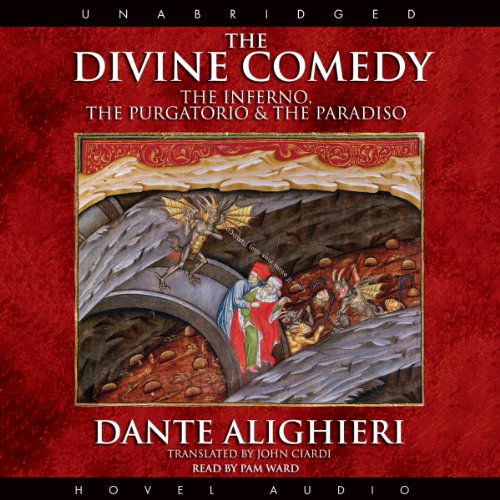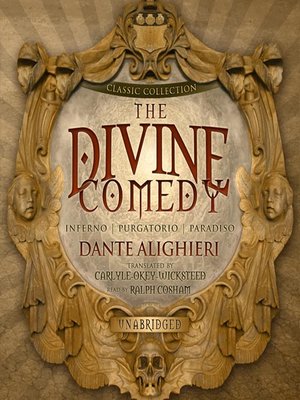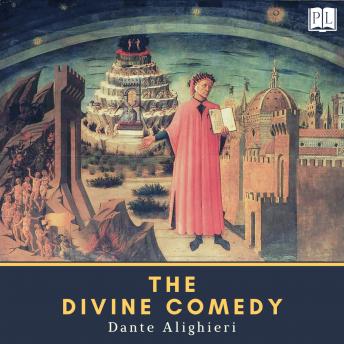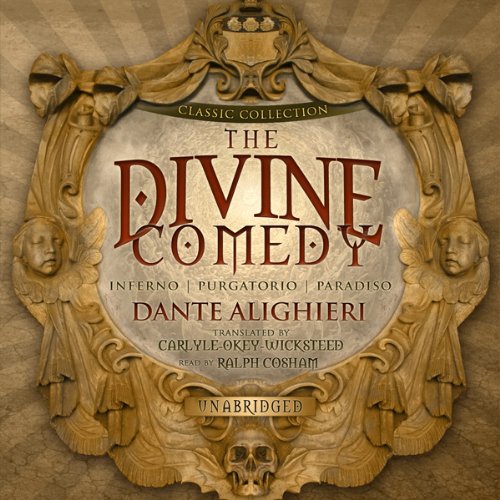Dante Alighieri’s “The Divine Comedy” audiobook is a captivating journey through Hell, Purgatory, and Heaven. This timeless classic explores themes of sin, redemption, and the human soul.
“The Divine Comedy” by Dante Alighieri stands as one of the most influential works in Western literature. This audiobook version brings the epic poem to life, making it accessible for modern listeners. Dante’s vivid descriptions and profound insights offer a deep exploration of morality and the afterlife.
As you listen, you will traverse the dark depths of Hell, the arduous climb of Purgatory, and the celestial heights of Heaven. Each part of this journey reveals Dante’s rich imagination and philosophical depth. This audiobook is a must-listen for anyone interested in classic literature and timeless stories.

Life And Times Of Dante Alighieri
Dante was born in Florence in 1265. His full name was Durante di Alighiero degli Alighieri. He had a keen interest in literature from a young age. Dante studied many subjects, including philosophy and theology. His early works show his deep knowledge. Dante’s love for Beatrice Portinari inspired much of his poetry. She was his muse and appears in his works.
Dante became involved in politics in Florence. He was part of the White Guelphs, a political faction. Political conflicts led to his exile in 1302. Dante spent the rest of his life wandering Italy. During this time, he wrote “The Divine Comedy”. This epic poem explores themes of life, death, and redemption. Dante’s exile deeply influenced his writing.

Introduction To The Divine Comedy
The Divine Comedy is an epic poem. It has three parts: Inferno, Purgatorio, and Paradiso. Each part has 33 cantos. The poem explores themes of sin, redemption, and salvation. Dante’s journey represents the soul’s journey to God. The work blends allegory with realism. It reflects medieval religious beliefs.
The Divine Comedy has influenced literature and art for centuries. Written in Italian, it made literature accessible. It is considered one of the greatest literary works. Dante’s vivid imagery and characters are unforgettable. The poem provides a deep philosophical and moral message. It reflects the medieval worldview. Its impact on culture is profound and lasting.
Journey Through The Inferno
The Inferno has nine circles. Each circle punishes different sins. The first circle is Limbo. Here, unbaptized souls live. The second circle is for the lustful. They are blown by strong winds. The third circle is for gluttons. They lie in mud and endure rain. The fourth circle punishes the greedy. They push heavy weights. The fifth circle is the river Styx. Here, the angry fight each other. The sixth circle is for heretics. They burn in flaming tombs. The seventh circle punishes violence. There are three rings. The eighth circle punishes frauds. It has ten ditches. The ninth circle is for traitors. They are frozen in ice.
Dante meets many characters. Virgil is his guide. He is a Roman poet. Beatrice is Dante’s love. She sends Virgil to help Dante. Charon ferries souls across the river. Minos judges the dead. He decides their fate. Cerberus guards the third circle. He is a three-headed dog. Plutus guards the fourth circle. He is the god of wealth. The Furies live in the sixth circle. They are angry spirits. Centaurs guard the seventh circle. They are half-man, half-horse. Geryon takes Dante to the eighth circle. He is a monster with three bodies. Lucifer is in the ninth circle. He is the king of Hell.

Ascent To Purgatorio
The Purgatorio has seven terraces. Each terrace represents a different sin. People work to purify their souls here. They climb from one terrace to the next. The first terrace is for pride. People carry heavy stones. The second terrace is for envy. Here, people have their eyes sewn shut. The third terrace is for wrath. People walk in thick smoke. The fourth terrace is for sloth. People run without stopping. The fifth terrace is for greed. People lie face down on the ground. The sixth terrace is for gluttony. People starve even though food is nearby. The seventh terrace is for lust. People walk through fire. These trials help purify souls. Each terrace brings people closer to heaven.
Purification is a slow process. People must endure hard trials. These trials cleanse their souls. Each sin requires a different trial. Pride is cleansed by carrying heavy stones. Envy is cleansed by having eyes sewn shut. Wrath is cleansed by walking in smoke. Sloth is cleansed by running non-stop. Greed is cleansed by lying face down. Gluttony is cleansed by starvation. Lust is cleansed by walking through fire. Each trial brings the soul closer to purity. The goal is to reach heaven.
Paradiso: The Final Frontier
The Paradiso describes Dante’s journey through Heaven. Nine spheres of Heaven exist. Each sphere represents a different level of blessedness. Dante ascends through these spheres. He meets saints and angels. They guide him with wisdom.
Dante encounters many blessed souls. Each soul has a story. These stories inspire and teach him. Beatrice, his beloved, is his main guide. Together, they explore the heavens. Dante learns about divine love and eternity. Each meeting fills him with joy and understanding.
The Divine Comedy In Modern Media
The Divine Comedy has inspired many books and stories. Writers love its rich themes and deep meaning. Many authors have used its ideas in their own works. This classic has changed the way people write. Its impact can be seen in books all around the world. Stories about journeys and self-discovery often borrow from it. Readers still find the poem’s lessons valuable today.
Many movies have been made based on The Divine Comedy. Directors use its scenes to create stunning visuals. Musicians also find inspiration in its verses. Some songs tell parts of Dante’s journey. Even video games borrow from its rich story. This poem continues to inspire artists in many fields.
Creating An Audiobook
Choose a clear and engaging voice for narration. Use different tones for different characters. Speak slowly and clearly. Avoid long pauses. Use emotion to bring the story to life. Practice reading to improve. Record in a quiet place. Edit mistakes with software. Listen to other audiobooks for ideas. Keep the listener engaged at all times.
Background music can set the mood. Use it sparingly to avoid distraction. Add sound effects for important scenes. Choose effects that match the story. Use soft sounds for calm scenes. Use louder sounds for action scenes. Balance sound levels carefully. Avoid using too many effects. Test the audiobook with listeners. Get feedback and make changes.
Why Listen To The Divine Comedy?
The Divine Comedy teaches important lessons about morality and ethics. The book explores themes of good and evil. Readers learn about historical figures and mythological characters. The audiobook format can help improve listening skills. This classic work enhances vocabulary and critical thinking. It provides insights into medieval culture and thought.
The Divine Comedy is a cultural treasure. It has influenced literature, art, and music. Listening to the audiobook helps understand the richness of Italian heritage. The story offers a glimpse into Dante’s vision of the afterlife. Appreciating this work connects us to centuries of tradition. It is a cornerstone of Western literature and philosophy. This audiobook provides an accessible way to experience a literary masterpiece.
Conclusion
The “Divine Comedy” audiobook brings Dante Alighieri’s timeless work to life. This experience is both captivating and educational. Dive into the rich narrative and profound themes. Enhance your literary journey with this accessible format. Don’t miss the chance to explore Dante’s masterpiece in a new, engaging way.



